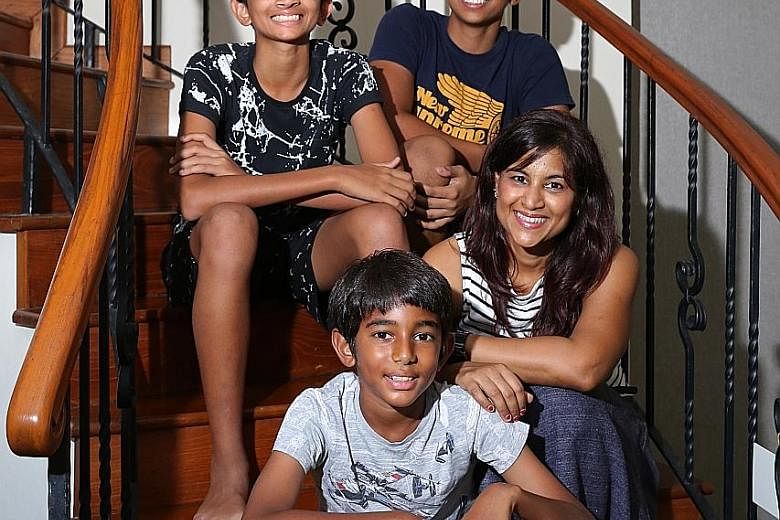Can I get my child exempted from mother tongue for the Primary School Leaving Examination (PSLE)? This question has been popping up in education forums after the recent announcement of changes to the PSLE scoring system, starting from 2021.
But experts say the Education Ministry keeps a tight rein on who can be granted the exception.
Still, there is some worry if more will be tempted to apply, in the hope of relieving their children of what could be their weakest subject, which could drag their PSLE score down.
Currently, under the aggregate score system, a pupil's stronger subjects can make up for their weaker ones, and pull up their overall result. But this will be replaced by scoring bands called Achievement Levels, ranging from AL1 to AL8.
The PSLE score will be the sum of ALs for English, maths, science and mother tongue, with 4 the best score and 32 the lowest.
The Ministry of Education (MOE) has acknowledged that a pupil's stronger subjects will have less of an impact in bringing up his or her final score under the new system. And this has raised the stakes for parents who believe their children will struggle with mother tongue.
Under the current system, pupils exempted from mother tongue will take three subjects at PSLE. But their result is still adjusted into a four-subject score. This is done by referring to how their peers with similar scores in English, maths and science performed.
In response to queries from The Straits Times, MOE said the same approach will continue under the new scoring system. A pupil exempted from mother tongue will be assigned a grade for the subject based on how peers of comparable calibre perform in it. The PSLE score will be the sum of ALs for his three subjects plus the assigned mother-tongue score.
Some parents have asked if this is fair, as the exempted children would probably be assigned a better mother-tongue grade than they may have earned on their own.
MOE made it clear that exemption is granted on a case-by-case basis. The key criterion is that the children have "certified special needs that adversely affect their ability to cope with learning". This includes issues such as dyslexia, autism spectrum disorder and attention deficit hyperactivity disorder (ADHD).
Those who have joined the education system mid-stream "without prior learning of one of the official mother-tongue languages or mother tongue languages-in-lieu" may also be considered for exemption.
Psychologists said cases of parents who try to abuse the system are rare, and it is not easy for pupils to be granted exemption even when they have been diagnosed with learning needs.
Between 2011 and last year, the proportion of pupils exempted from studying mother tongue has remained stable, at 3.5 per cent of each PSLE cohort, MOE said.
About 1 per cent of every cohort also take foreign languages such as French or German in lieu of an official mother tongue. Eligibility for this depends on various factors, including the pupil's parentage and nationality.
Mrs Lee Ming Ying, an educational psychologist and therapist at Cheers Learning Services, said she has seen more pupils with learning difficulties being encouraged by the authorities to take mother tongue at foundation level, which has a less demanding curriculum, rather than being exempted.
"Parents will usually hope to get exemption because doing the subject at foundation level may mean a higher likelihood of (their children) being sorted into the Normal (Academic) stream rather than Express.
"But in the past one or two years, I've heard of parents who have had their applications for exemption rejected even after the second try," said Mrs Lee, who sees about two to three pupils for psychological assessments every month.
Ms Polene Lam, principal of Gifted Academy, a psychological and learning centre, said: "If a pupil has no genuine learning difficulties, we will tell the parents that there are no grounds for exemption."
Mrs Denise Ponnampalam-Vijayan, 44, a counsellor, said being exempted from mother tongue had helped her son improve his overall PSLE score as he could devote more time to other subjects. Her son, now 15, was diagnosed with dyslexia, ADHD and severe receptive language disorder in primary school.
The counsellor insisted on having her other three children, who all take Chinese as her husband is Malayalee and she is of mixed parentage, continue with the subject despite their appeals to her to apply for exemption as they find it tough.
"I don't want any psychological labels being given to them unnecessarily, and learning another language may still be useful for them."
However, she questioned whether it is fair for children who have been away from Singapore to be exempted from mother tongue. "The child who comes back from overseas has this benefit...(his) score may be higher than another child with no learning challenge but struggling in the mother tongue."
Safety officer Brian Soon, 36, sees it differently. He has applied twice without success to exempt his Primary 3 daughter from Chinese after they moved back to Singapore last year. He said he was not given a clear reason why she was not exempted.
He said: "She was born in New Zealand and was never exposed to the Singapore system, and even her Chinese teacher gave us feedback that she is unable to understand basic Mandarin. You can't expect her to catch up with the local students so fast. "


